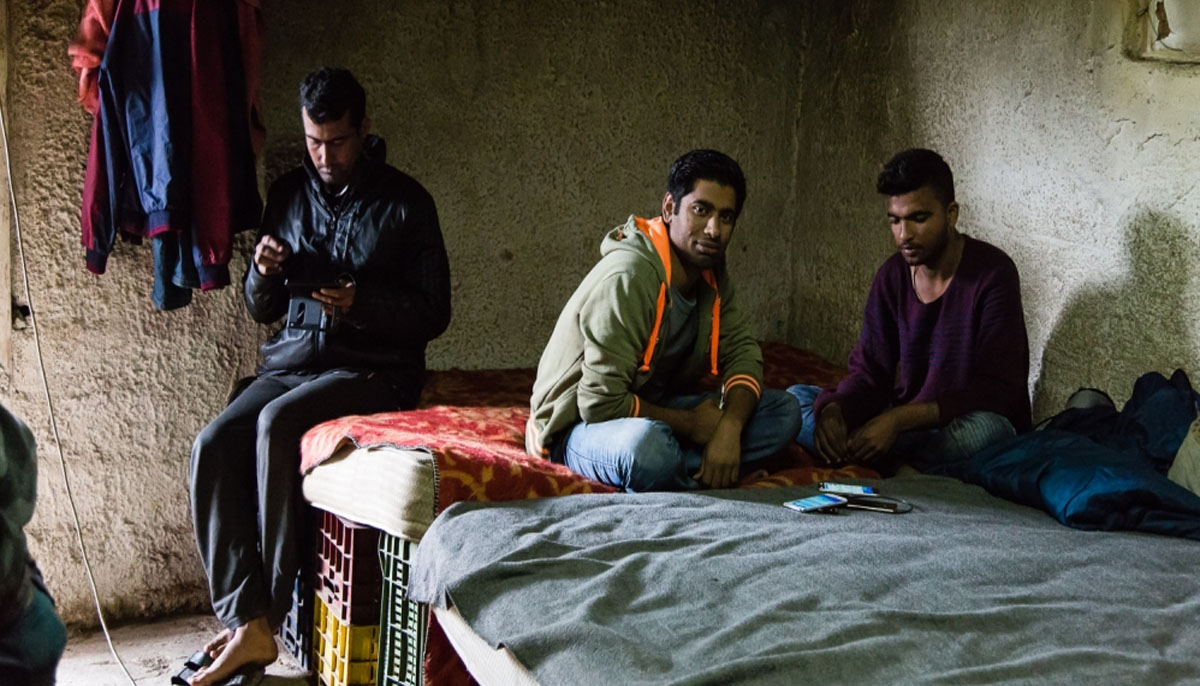Illegal workers in S Arabia look to virus for escape
RIYADH: Jobless and broke, Sudanese electrician Hatem is stranded in limbo in Riyadh like countless other illegal workers, but he hopes the fast-spreading coronavirus will offer a chance for escape.
While coronavirus drives a huge exodus of expatriates, campaigners say potentially hundreds of thousands of illegal workers remain stranded in Saudi Arabia, complicating efforts to fight the disease.
The pandemic has laid bare what activists call systemic injustices roiling the lives of blue-collar foreign workers in Saudi Arabia -- overcrowded housing, exploitative employers and a lack of effective recourse.
Campaigners have called on Saudi Arabia to reform its long-criticised labour policy and offer an amnesty to poor debt-ridden workers trapped in the country, a predicament that risks fuelling the pandemic.
The problem is rooted in the "kafala" sponsorship system, described by critics as a modern form of slavery that binds workers to their Saudi employers, whose permission is required to enter and exit the kingdom as well as to change jobs.
Employers also hold enough sway to render their status illegal, according to activists and interviews with four undocumented workers, including Hatem, a 45-year-old electrician living in hiding in Riyadh to avoid arrest.
"My six kids, my old mother, my sister in Sudan... are living in a difficult situation, but I live in much worse conditions," Hatem told AFP in his squalid Riyadh apartment, which he shares with other workers.
"The sponsorship system is very unjust," said Hatem, who arrived in 2016. Saudi Arabia, home to around 10 million expats, has expelled hundreds of thousands of illegal workers in recent years.
But many like Hatem who are stuck in a debt trap are not permitted to leave before settling their dues, even as kafala curbs prevent them from legally earning their way to freedom. "The Saudi government should offer an amnesty for irregular migrants to regularise their status or return to their home countries," Annas Shaker, a research fellow at the advocacy group Migrant Rights, told AFP.
Holding back such workers, many of whom are forced to go into hiding, risks fanning the pandemic, observers including Shaker warned. Saudi Arabia has reported over 200,000 infections and nearly 2,000 deaths. Hospital sources say doctors and nurses are among those dying and intensive care units are stretched beyond capacity.
-
 Dax Shepard Describes 'peaceful' Feeling During Near-fatal Crash
Dax Shepard Describes 'peaceful' Feeling During Near-fatal Crash -
 Steve Martin Says THIS Film Has His Most Funny Scene
Steve Martin Says THIS Film Has His Most Funny Scene -
 Kensington Palace Shares Update As Prince William Continues Saudi Arabia Visit
Kensington Palace Shares Update As Prince William Continues Saudi Arabia Visit -
 Fugitive Crypto Scammer Jailed For 20 Years In $73m Global Fraud
Fugitive Crypto Scammer Jailed For 20 Years In $73m Global Fraud -
 Will Andrew Mountbatten-Windsor Finally Go To Jail Now That King Charles Has Spoken Out? Expert Answers
Will Andrew Mountbatten-Windsor Finally Go To Jail Now That King Charles Has Spoken Out? Expert Answers -
 Melissa McCarthy Reveals Her Tried And Tested ‘corpse’ Night Time Routine That’s Lost Her 95lbs
Melissa McCarthy Reveals Her Tried And Tested ‘corpse’ Night Time Routine That’s Lost Her 95lbs -
 Horrifying Pictures Of The Kidnapper Of Savannah Guthrie's Mother Released
Horrifying Pictures Of The Kidnapper Of Savannah Guthrie's Mother Released -
 Andrew's Ex-girlfriend Launches Brazen Attack On Epstein Victims On Piers Morgan Show
Andrew's Ex-girlfriend Launches Brazen Attack On Epstein Victims On Piers Morgan Show -
 Andrew Mountbatten-Windsor 'on His Own' As Palace Gives Green Light To Law Enforcement
Andrew Mountbatten-Windsor 'on His Own' As Palace Gives Green Light To Law Enforcement -
 Kanye West's Tweet About Super Bowl Halftime Resurfaced After Bad Bunny's Show
Kanye West's Tweet About Super Bowl Halftime Resurfaced After Bad Bunny's Show -
 'FBI' Star Juliana Aidén Martinez Tease Her Return To 'Law And Order: SVU' After Quitting
'FBI' Star Juliana Aidén Martinez Tease Her Return To 'Law And Order: SVU' After Quitting -
 Cardi B's Emotional Words To Pal Amid Stefon Diggs Rumored Breakup Revealed
Cardi B's Emotional Words To Pal Amid Stefon Diggs Rumored Breakup Revealed -
 Princess Eugenie Breaks Cover Amid Explosive Family Scandal
Princess Eugenie Breaks Cover Amid Explosive Family Scandal -
 Will Kate And Anthony Have 'Bridgerton' Spin Off? Revealed
Will Kate And Anthony Have 'Bridgerton' Spin Off? Revealed -
 Schoolgirl Eaten Alive By Pigs After Brutal Assault By Farmworker
Schoolgirl Eaten Alive By Pigs After Brutal Assault By Farmworker -
 King Charles’ Statement About Epstein Carries A Secret Meaning: Here’s Why It Can Be An Invite To Police
King Charles’ Statement About Epstein Carries A Secret Meaning: Here’s Why It Can Be An Invite To Police




